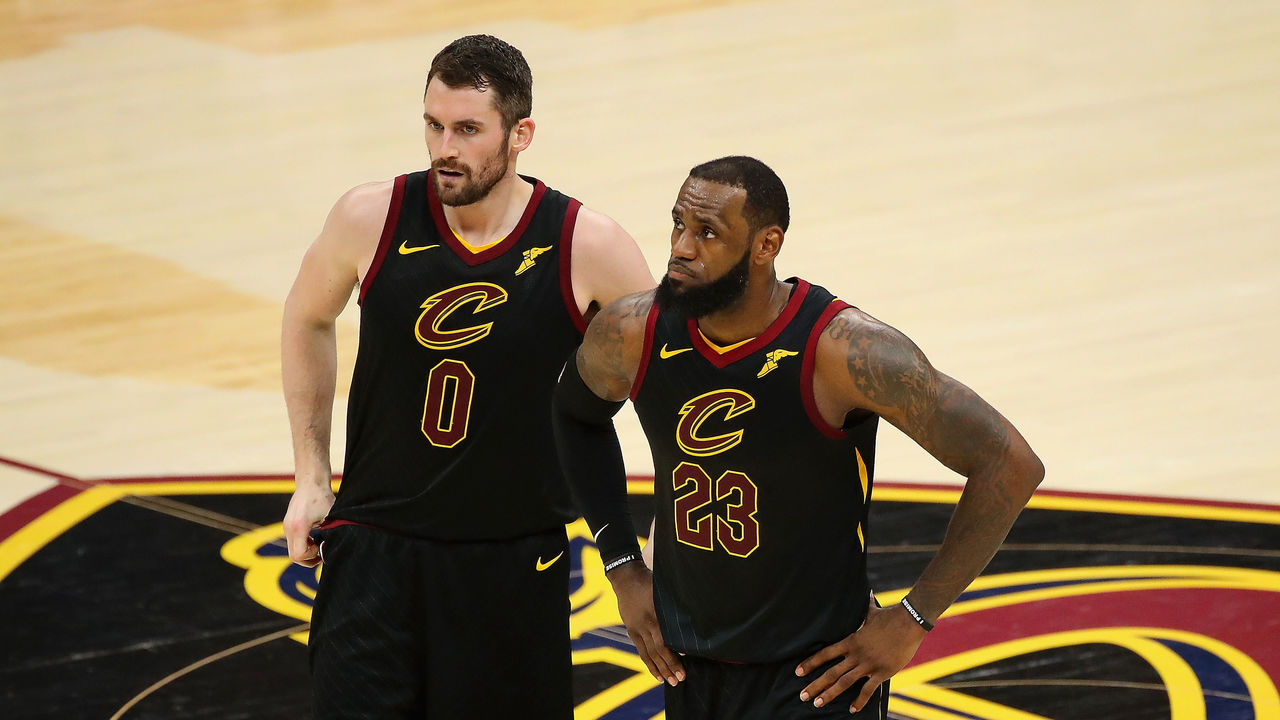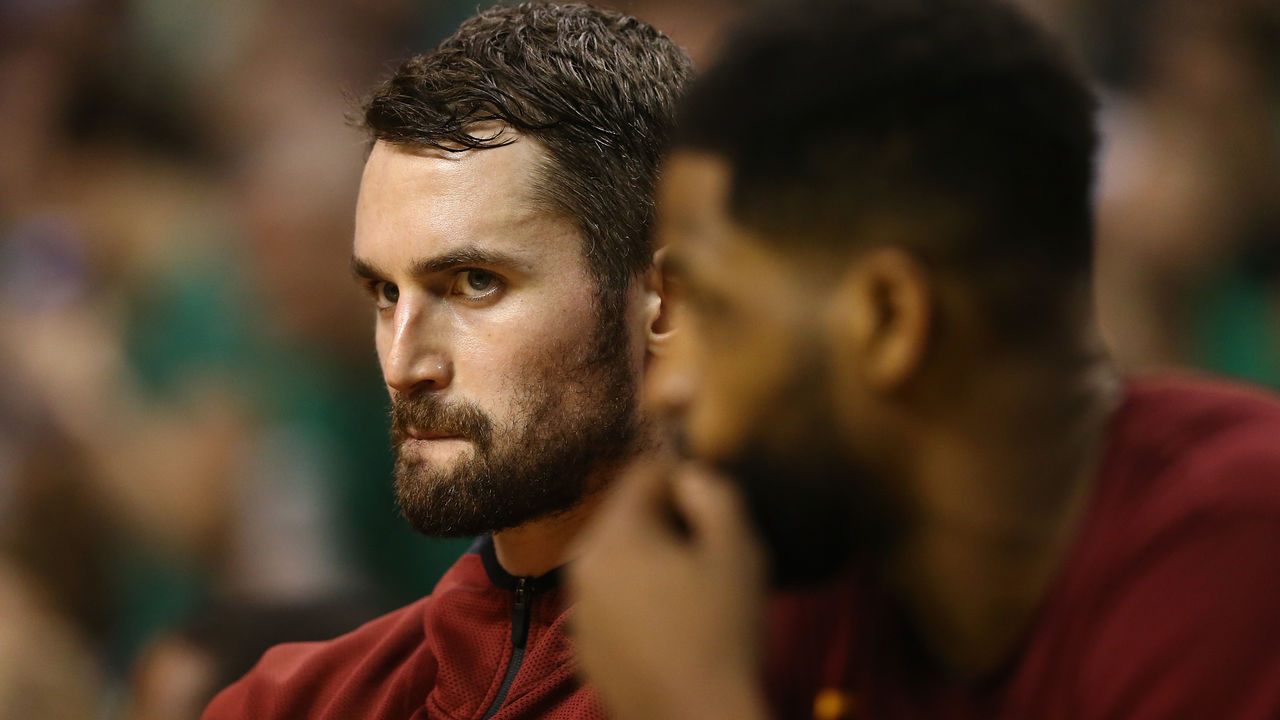Cavs consign themselves to NBA purgatory with lucrative Love extension
One of the biggest and most interesting questions going into this offseason was what the Cleveland Cavaliers would do if and when LeBron James skipped town.
A full-scale rebuild appeared to be their most likely, and most sensible, course of action. But the Cavs signaled a different direction Tuesday when they inked Kevin Love to a four-year, $120-million extension that will pay him near-max money through his age-35 season in 2022-23. Before that announcement, Love seemed like a prime trade candidate. Now, he can't be dealt for at least six months, and he may be considerably harder to move once he's eligible to be traded again.
Cleveland's front office is putting its money where its mouth is, backing up its talk that the team won't bottom out in the wake of LeBron's departure the way it did the first time around. The Cavs spent four years in the wilderness before their prodigal son returned in 2014, averaging 25 wins a season and enduring the occasional seven-week-long losing streak while attendance cratered and their owner fumed in Comic Sans. Though they landed the No. 1 overall pick three times during that span, there's scant evidence that even their improbable lottery luck would've made them anything more than a middle-of-the-road playoff team had James not come home from his sojourn in Miami.
So, their reluctance to enter a scorched-earth rebuild makes some sense. In Love, they retain some semblance of respectability. He's still an All-Star-caliber big man, and while it's been four years since he was asked to be the fulcrum of an offense, the last team to feature him as a primary option (the 2013-14 Minnesota Timberwolves) scored at a top-10 rate. Whether or not the '13-14 version of Love still exists, it's reasonable to assume he can do more than what's been asked of him as a Cavalier to this point. Playing alongside LeBron meant fewer touches, reduced playmaking duties, less time working inside the arc, and more time spotting up on the perimeter.

In his final season with the Timberwolves, Love averaged 86.5 touches, 51.1 frontcourt touches, and 2.8 minutes per game with the ball in his hands. Last season with the Cavs, he averaged 52.3 total touches, 28.2 frontcourt touches, and 1.4 on-ball minutes per game. His usage rate dipped from 28.8 percent in 2013-14 to 25.1 percent last season, and his assist rate plummeted from 21.4 percent to 9.8 percent. But Love remains one of the game's most skilled offensive bigs, and his rebounding and shooting numbers are still elite (he posted a career-best 61.4 true shooting percentage in 2017-18). Put the ball in his hands more often, let him operate more frequently from the elbows and the post, and you might see something closer to the player who averaged 26.1 points, 12.5 rebounds, and 4.4 assists en route to an All-NBA second-team nod in his final season in Minnesota.
Here's the thing, though: That Wolves team was not particularly good, and every preceding Wolves team built around Love was worse. Last season's Cavaliers squeaked through the Eastern Conference to make the NBA Finals for a fourth straight year, but by most measures, they were one of the worst Finals teams ever, with a 29th-ranked defense and the point differential of a 43-win team. And that was with LeBron playing in every single game and leading the NBA in minutes. Even if Love returns to his Minnesota peak, the Cavs will be bad next season.
And hanging on to Love may stop them from being as bad as they need to be. The Cavaliers need to rebuild their talent base through the draft (even if they seem intent on treating "rebuild" as a dirty word), and they need their 2019 first-round pick to land inside the top 10 in order to keep it. That's far from impossible, especially with draft reform set to kick in and flatten out the lottery odds next year, but Love staying in Cleveland makes it significantly less likely.
The Cavaliers can still theoretically trade him before the end of next season, but they just attached huge long-term money to a player with a checkered injury history who can't capably guard pick-and-roll and plays a non-premium position, in a league that's grown increasingly infatuated with financial flexibility and short-term deals. Until Love put pen to paper Tuesday, he was on a two-year contract worth about $50 million with a player option for 2019-20. Now, he's owed $145 million over the next five years. Yes, the Clippers managed to get rid of Blake Griffin's contract and fetch a strong return a few months after signing him to a five-year max, but that move also basically cost Stan Van Gundy his job in Detroit, and at the moment, it looks more like a cautionary tale than a sign of things to come.

It's difficult to suss out a coherent front-office strategy here. Couldn't the Cavaliers have waited to see how the team looked with Love as its centerpiece before committing this much term? Were they so afraid of another team maxing him out in free agency next summer? Wouldn't maintaining Love's trade value have been worth the risk considering the franchise is about to turn the page regardless? And if they're aiming to stay competitive, why is the team reportedly trying to dump Kyle Korver just to get out from under his comparatively modest salary?
All told, this move looks like it will damn the Cavs to the treadmill of mediocrity for the foreseeable future. Love's strengths should prevent the team from completely going into the tank, while his shortcomings - and those of Cleveland's roster as a whole - will prevent them from being meaningfully competitive. Rookie point guard Collin Sexton offers intrigue as a potential building block, but the Cavs are otherwise shockingly thin on young talent and lack the draft assets to replenish it. They project to have a boatload of cap space in 2020, but it's hard to imagine marquee free agents lining up to join forces with Love in Cleveland. It's more likely the Cavs, hamstrung by their unglamorous market and lack of long-term upside, will wind up overpaying their own players and mid-tier free agents, the way other small-to-mid-market teams like the Pistons and Hornets have.
There are ways for Cleveland to escape that perpetual purgatory, though they require some unlikely, if not impossible, circumstances. One route involves Love playing well enough to goose his trade value, to the point that the Cavs get a better return than they would've by dealing him this summer. Another route requires Sexton to take off and develop a dynamic two-man synergy with Love, allowing the front office to fill out the roster with capable role players plucked from the middle of the draft and the free-agent bargain bin. Beyond that, the Cavs are left banking on major breakouts from guys like Larry Nance Jr. and Rodney Hood (assuming they even re-sign the two restricted free agents), as well as Cedi Osman. That feels a bit fanciful, to be generous.
What does seem clear is that the Cavs, for as long as they're Kevin Love's team, will top out at so-so. Given the misery of their first post-LeBron years, maybe that's a scenario they'll happily abide.
(Photos courtesy: Getty Images)